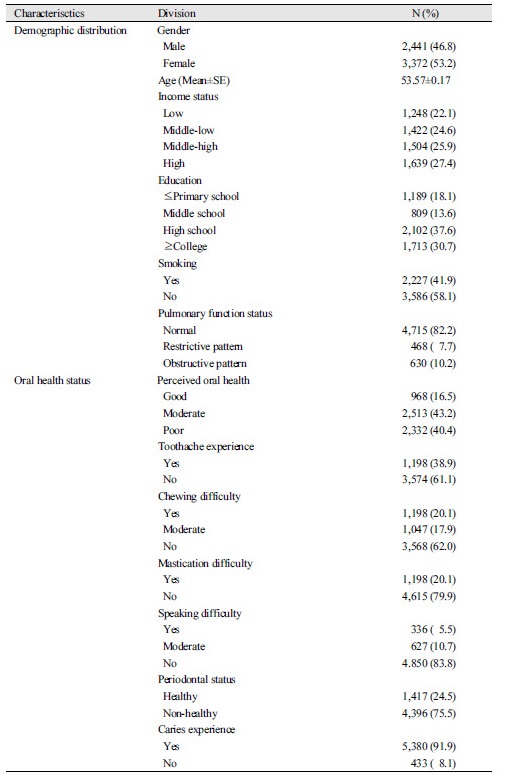Abstract
Objectives: The purpose of this study is to identify the association between oral health status and pulmonary ventilatory defects. Methods: The 6th (2013-2015) National Health and Nutrition Examination Survey data was used. The study subjects were those aged 40-79 who had pulmonary function examination. Complex samples general linear model analysis, Complex samples cross-tabulation analysis, and Complex samples logistic regression analysis were conducted. Results: In terms of restrictive ventilatory defects, the study subjects (8.3%) who recognized that their oral health status was bad outnumbered those who recognized that their oral health status was good (6.1%) (p<0.05). Many of the study subjects who experienced difficulty in biting, chewing and/or speech, and who had an unhealthy periodontal had restrictive ventilatory defects and obstructive ventilatory defects (p<0.05). The association between oral health status and pulmonary ventilatory defects was analyzed. The findings showed that those who had unhealthy periodontal had a 1.33 times higher probability of pulmonary ventilatory defects than those who had a healthy periodontal (p<0.05). After taking into account general characteristics (age, sex, incomes, education, and smoking) of the subjects, the association between oral health status and pulmonary ventilatory defects was analyzed. The result found that only in cases where one experienced dental caries was an association with pulmonary ventilatory defects found. In other words, those who had dental caries showed a 0.73 times higher probability of pulmonary ventilatory defects than those who had no dental caries (p<0.05). Conclusions: Based on the findings of this research, oral health status was found to be associated with pulmonary ventilatory defects. To improve oral health, it is necessary to provide life-cycle stages based oral health education. Therefore, it is required to develop an oral health education program and develop a national oral health policy.
Acknowledgements
이 논문은 2018년도 1학기 원광보건대학교 교내연구비 지원에 의해서 수행됨.
Figures & Tables

Table 1. Characteristics of the study subjects


